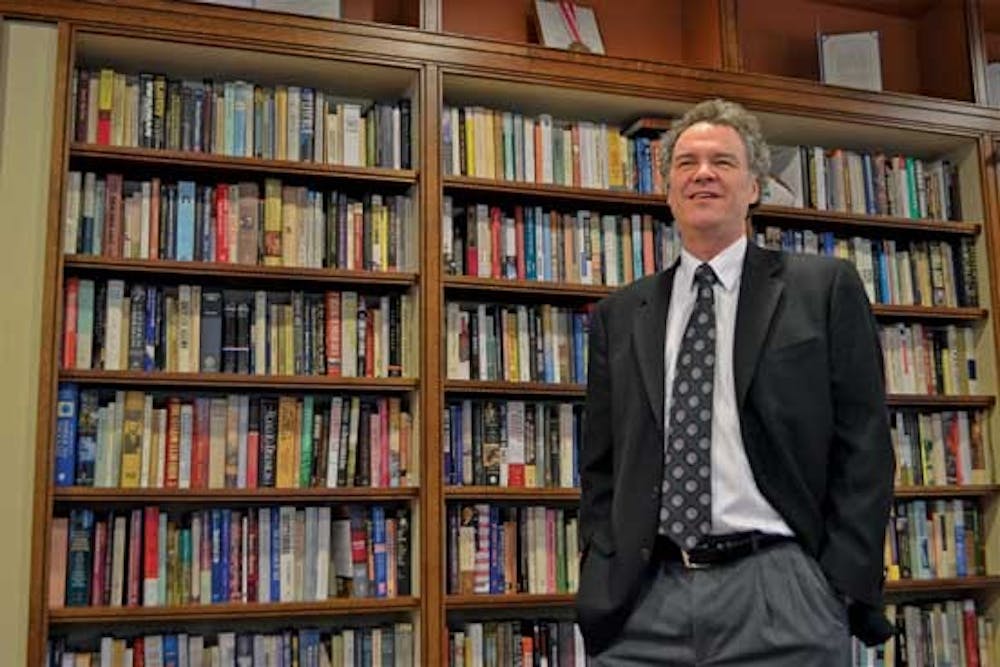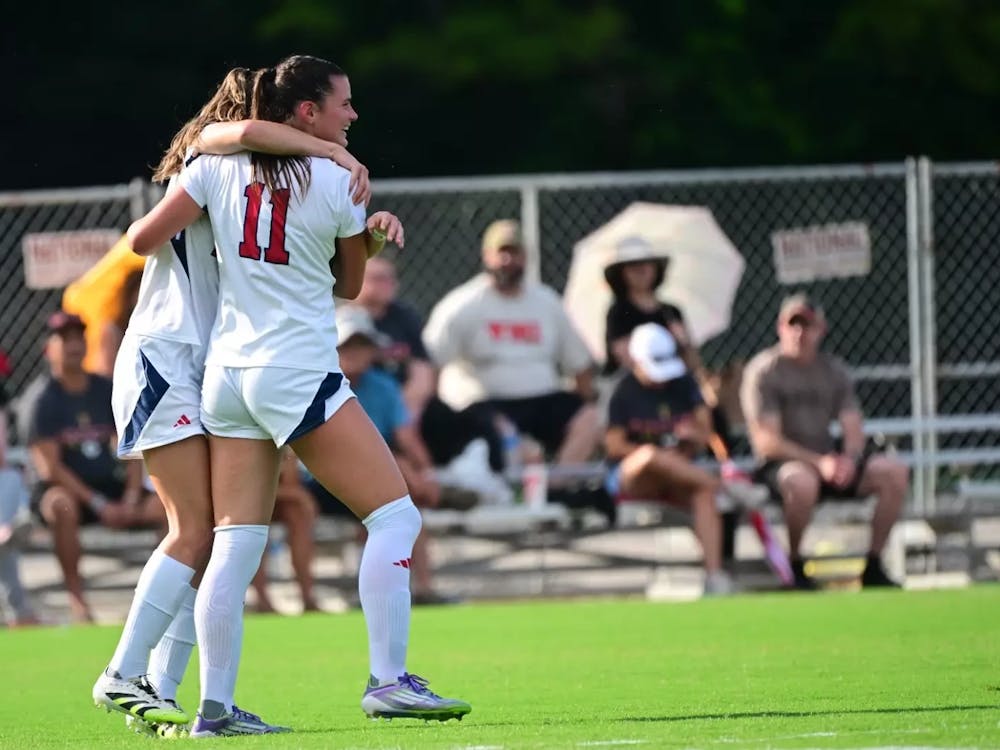Last Friday, Edward Ayers announced he would be stepping down as university president after next academic year.
It will be his eighth year as president, and will coincide with the culmination of the Richmond Promise and Fulfilling the Promise campaigns.
In this March 7 interview, Ayers spoke in his office about the past, present and future of his role as president and his relationship with the University of Richmond
Clay Helms: In leading up to this decision, when did it first become a consideration for you and when did that consideration transition into a personal decision?
President Ayers: I knew that by my contract I had to give the board an answer in March if I was going to renew for another year. My wife and I just talked it over during the winter break, and said you know we're coming up on actually accomplishing the things we said we would do - the Richmond Promise and the campaign. I could see by this point that we were going to be able to finish the latter.
Transitioning out is a long process, because one of my highest goals is to have an effective transition with an excellent successor, and it just takes a long time to get the community mobilized, to get the word out, to get the best people in the country engaged with us. I just needed to give the university a chance to take the next step. It was triggered by needing to tell the board now.
Also the fact that next year is the centennial of Westhampton, the end of the sesquicentennial, the civil war emancipation that I've been so invested in - 2015 just seemed like a good time to go to the next chapter.
Helms: Over the course of your time here, with the steady upward trajectory we've had in many ways as a university, it seems like that trajectory will make the job more appealing to a top-notch successor.
Ayers: Yes. This place really doesn't have a limit to its capacity. There's no limit to how good we can be. The school is so strong already, the city is healthy, the place where we live is so beautiful and so well-located, the configuration of schools we have is unique, the investments we've made in student-faculty ratio, all of those things are so strong. Actually creating a student body that looks more like the world sort of took the lid off of how good we could be. I think it's really one of the healthiest and most exciting schools in the country, so we should be able to get somebody great.
Helms: What kind of feedback have you received from friends and colleagues since your announcement?
Ayers: Well, I joke that it's been a little bit like being at my own funeral. (laughs) People have been extremely kind. People I don't know and students just saying thanks and that they appreciate it. My goal going forward is for people in the world to understand what kid of place Richmond is now. It's not so much about me as it is about the incredible momentum that we have. And it's important to me that people in our own city understand that we bring the whole world here, and that we're one of the most generous schools in the country, and that we are really fostering opportunity in lots of different ways. It's important to me that people understand the Richmond story, which is relatively recent. Some people have a stereotype about us that I hope we can use this transition to expel. I want to get the information out about the over 100 percent increase in students of color. I want to get out the story about doubling international students, that the freshman class has people from 40 states and 40 countries. How many places can say that? The goal is to do everything I can to keep this momentum going, that is my purpose, that we don't lose any momentum in the handoff. I've described this job from the very beginning as: it should be running a leg in a relay; it's not a marathon. I wasn't just trying to settle in for this job as long as I could. I was trying to get things done, and run as hard as I could, and then let the next person run as hard as she or he can. I think that's what you really need in a president.
Helms: What are you most looking forward to when you are finally able to step down and don't have the everyday burden of being the president?
Enjoy what you're reading?
Signup for our newsletter
Ayers: In 2003 I published a book "In the Presence of Mine Enemies," and it won the Bancroft prize, which is the top award in my field, and it's volume one in a two volume set. (laughs) People will write me with some frequency saying "Hey, I just finished your book is volume two about done?" And as a type-A personality who really likes more than anything checking off something on the list, not to have checked off volume two of a two-volume work has weighed on me. (laughs) The thing I've not been able to do over the last seven years is writing for the book.
Writing a book is like a dream-state. You have to be completely saturated in those characters and that evidence and the story you're telling, and this job keeps waking you up. I miss more than anything the satisfaction of settling in and writing a book, so that's what I will do the year after I leave.
Helms: What are you most proud of accomplishing during your presidency?
Ayers: I think that we've been able to tap into generations of good will and devotion among the faculty and staff, and give them a sense of common direction. One of the great pleasures of my job is meeting people at every step of the relationship to the university. The commonality has always been the same -- that the faculty actually pays attention to the students, and that is rapidly leaving American higher education.
This is a place where the core is the relationship between the students and faculty and among students in a close community. So trying to combine the academic rigor, which we already had, with the joy of being together. And I think that that's been sort of an unusual combination, to recognize that this should be a joyous experience even as you prepare for a career or a job. And that giving something to the city where you live is joyful, meeting people unlike yourself is joyful, submerging ourselves in a common experience is joyful. So I think that's what we've been trying to do, is lead with a sense of optimism and with a sense of possibility. I think if we've brought something, that's what it is.
You notice that I'm saying "we" with all of these things. A presidency is symbolic as much as anything, but the hard work is done really by other people. My cabinet is 12 vice presidents and directors who are just remarkable. As I think about the incredible contributions that everybody makes, the great joy of it has been working together to accomplish something better than anything we could have accomplished individually.
Helms: Looking back on the past seven years, what do you think has been the most challenging time for you?
Ayers: There's no doubt, if you ask any president what is the hardest part of the job, it's something I've had to do several times, which is talk to parents who have lost their children. That puts anything else into perspective very quickly. You do that a few times and anything else is insignificant. And you realize this is the flipside of being in a place that touches people's lives so deeply, for the rest of their lives. The cost is when we lose somebody, you realize two things: one, the depth of the loss, but how comforting it has been to those parents to see the friends and teachers of their sons and daughters come together. It's very sad and challenging, but on the other hand you realize what a great gift we are to them.
Helms: You said in your inaugural address that we need to look at the shadows of the past as well as the light, and not shy away from those shadows, and let this timeline of where we've come from guide us to where we want to go. So now that we're here now, how have those shadows and lights of the past driven your vision from where you were when you made your inaugural speech?
Ayers: I think that I feel mainly a sense of responsibility from the past in two ways: One, to live up to the faith of people like the Robins and the Weinsteins and the Jepsons and others have shown us, who have transformed the place with incredible philanthropy, and to have no obligation to anything other than the best we can do. There's no other body that controls or directs us to whom we are accountable, and all we have to do is the best we possibly can.
The other is from being a historian of the American south: to recognize that we're inheriting an obligation to create as much opportunity and progress as we can. We're living in a part of the country that invented slavery for the United States, and it was the capital of the confederacy and it lived under segregation for all those years. And now we find ourselves free to help imagine a new stage of what this landscape could be.
I get up everyday feeling a sense of responsibility to take advantage of our own moment in time. We're filled with possibilities that people before us have not had, to create opportunities for all kinds of people. It is true that the historical perspective is basically my perspective.
You realize you get one shot at living in time, and the Richmond Promise is what I would do with my one shot. To create the most progressive school we possibly could in the former capital of the confederacy is kind of what this has been about.
Contact staff writer Clay Helms at clay.helms@richmond.edu
Support independent student media
You can make a tax-deductible donation by clicking the button below, which takes you to our secure PayPal account. The page is set up to receive contributions in whatever amount you designate. We look forward to using the money we raise to further our mission of providing honest and accurate information to students, faculty, staff, alumni and others in the general public.
Donate Now



